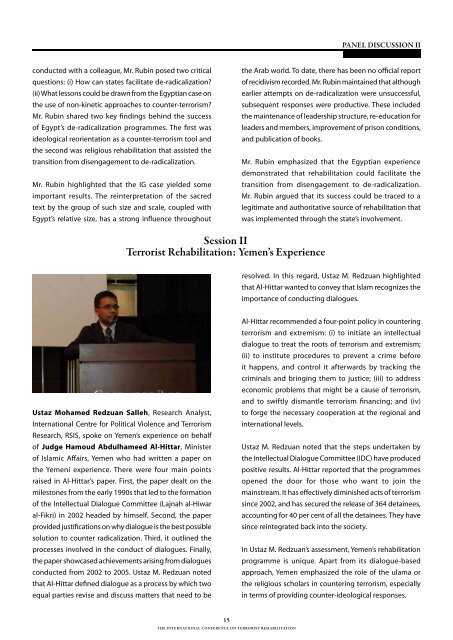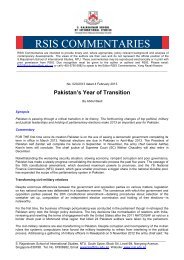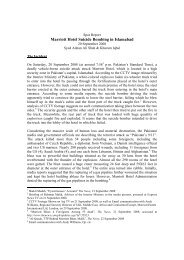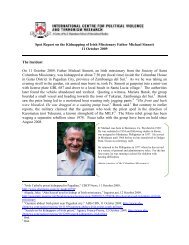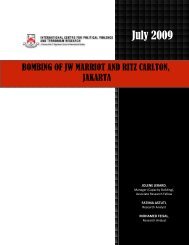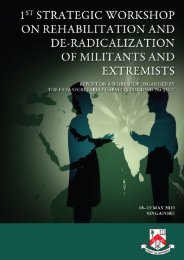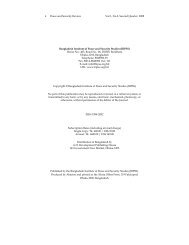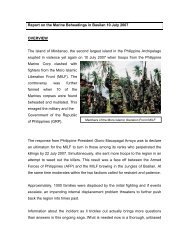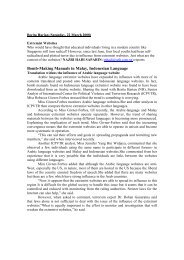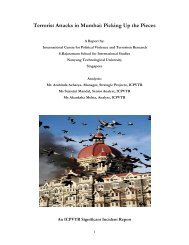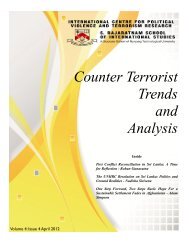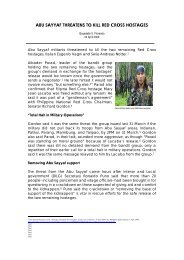International Conference On Terrorist Rehabilitation
International Conference On Terrorist Rehabilitation
International Conference On Terrorist Rehabilitation
Create successful ePaper yourself
Turn your PDF publications into a flip-book with our unique Google optimized e-Paper software.
PANEL DISCUSSION II<br />
conducted with a colleague, Mr. Rubin posed two critical<br />
questions: (i) How can states facilitate de-radicalization?<br />
(ii) What lessons could be drawn from the Egyptian case on<br />
the use of non-kinetic approaches to counter-terrorism?<br />
Mr. Rubin shared two key findings behind the success<br />
of Egypt’s de-radicalization programmes. The first was<br />
ideological reorientation as a counter-terrorism tool and<br />
the second was religious rehabilitation that assisted the<br />
transition from disengagement to de-radicalization.<br />
Mr. Rubin highlighted that the IG case yielded some<br />
important results. The reinterpretation of the sacred<br />
text by the group of such size and scale, coupled with<br />
Egypt’s relative size, has a strong influence throughout<br />
the Arab world. To date, there has been no official report<br />
of recidivism recorded. Mr. Rubin maintained that although<br />
earlier attempts on de-radicalization were unsuccessful,<br />
subsequent responses were productive. These included<br />
the maintenance of leadership structure, re-education for<br />
leaders and members, improvement of prison conditions,<br />
and publication of books.<br />
Mr. Rubin emphasized that the Egyptian experience<br />
demonstrated that rehabilitation could facilitate the<br />
transition from disengagement to de-radicalization.<br />
Mr. Rubin argued that its success could be traced to a<br />
legitimate and authoritative source of rehabilitation that<br />
was implemented through the state’s involvement.<br />
Session II<br />
<strong>Terrorist</strong> <strong>Rehabilitation</strong>: Yemen’s Experience<br />
resolved. In this regard, Ustaz M. Redzuan highlighted<br />
that Al-Hittar wanted to convey that Islam recognizes the<br />
importance of conducting dialogues.<br />
Ustaz Mohamed Redzuan Salleh, Research Analyst,<br />
<strong>International</strong> Centre for Political Violence and Terrorism<br />
Research, RSIS, spoke on Yemen’s experience on behalf<br />
of Judge Hamoud Abdulhameed Al-Hittar, Minister<br />
of Islamic Affairs, Yemen who had written a paper on<br />
the Yemeni experience. There were four main points<br />
raised in Al-Hittar’s paper. First, the paper dealt on the<br />
milestones from the early 1990s that led to the formation<br />
of the Intellectual Dialogue Committee (Lajnah al-Hiwar<br />
al-Fikri) in 2002 headed by himself. Second, the paper<br />
provided justifications on why dialogue is the best possible<br />
solution to counter radicalization. Third, it outlined the<br />
processes involved in the conduct of dialogues. Finally,<br />
the paper showcased achievements arising from dialogues<br />
conducted from 2002 to 2005. Ustaz M. Redzuan noted<br />
that Al-Hittar defined dialogue as a process by which two<br />
equal parties revise and discuss matters that need to be<br />
Al-Hittar recommended a four-point policy in countering<br />
terrorism and extremism: (i) to initiate an intellectual<br />
dialogue to treat the roots of terrorism and extremism;<br />
(ii) to institute procedures to prevent a crime before<br />
it happens, and control it afterwards by tracking the<br />
criminals and bringing them to justice; (iii) to address<br />
economic problems that might be a cause of terrorism,<br />
and to swiftly dismantle terrorism financing; and (iv)<br />
to forge the necessary cooperation at the regional and<br />
international levels.<br />
Ustaz M. Redzuan noted that the steps undertaken by<br />
the Intellectual Dialogue Committee (IDC) have produced<br />
positive results. Al-Hittar reported that the programmes<br />
opened the door for those who want to join the<br />
mainstream. It has effectively diminished acts of terrorism<br />
since 2002, and has secured the release of 364 detainees,<br />
accounting for 40 per cent of all the detainees. They have<br />
since reintegrated back into the society.<br />
In Ustaz M. Redzuan’s assessment, Yemen’s rehabilitation<br />
programme is unique. Apart from its dialogue-based<br />
approach, Yemen emphasized the role of the ulama or<br />
the religious scholars in countering terrorism, especially<br />
in terms of providing counter-ideological responses.<br />
15<br />
THE INTERNATIONAL CONFERENCE ON TERRORIST REHABILITATION


